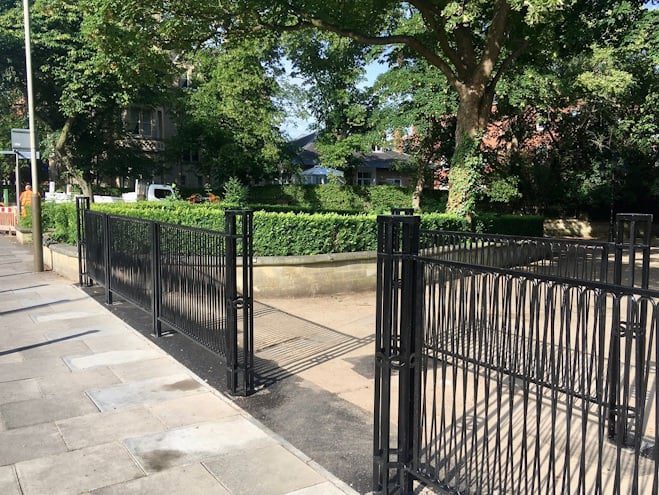New ornate barriers are being installed on Leicester’s New Walk in a bid to deter illegal cycling on the historic pedestrian route.
New railings at the Granville Road end of New Walk are being fitting in an arrangement that will make it harder for cyclists to enter, but provide an attractive gateway for pedestrians onto the 18th century tree-lined walkway.

The metal panels have been made by a local blacksmith to a design that complements existing fencing elsewhere on New Walk. They will be installed in secure sockets to allow sections to be removed in the case of an emergency or for large-scale events such as the Leicester Half Marathon.
It is hoped that the new barriers will help stop cyclists from illegally using New Walk, and encourage them onto the nearby cycle routes on London Road and Lancaster Road that run parallel to the historic walkway. New signs directing cyclists to the routes have also been installed on New Walk.
Cycling on the route is banned but there have been persistent issues with riders flouting the rules and travelling at speed, particularly downhill towards the city centre.
The work is part of wider investment being made as part of the New Walk Conservation Area Management Plan. This sets out a range of actions and policies that will help further protect historic buildings and improve open space on and around the popular Grade II-listed Georgian promenade.
Cllr Geoff Whittle, assistant city mayor for environment and transport, said: “Unfortunately, people cycling illegally on New Walk continues to be a problem despite the major investment the city council has made in ambitious schemes to provide safe cycle routes on London Road and Lancaster Road.
“The new barriers are designed to provide an attractive gateway for pedestrians onto this well-loved route, while deterring cyclists and encouraging them to use the purpose-built routes nearby.
“By doing this, we can help protect the unique character of this historic promenade and help make it safe for people to enjoy as it was intended for many generations to come.”
Installation of the new barriers is expected to be substantially complete by late-July and will cost about £50,000.



